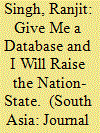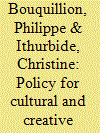|
|
|
Sort Order |
|
|
|
Items / Page
|
|
|
|
|
|
|
| Srl | Item |
| 1 |
ID:
167095


|
|
|
|
|
| Summary/Abstract |
This paper draws on an ethnographic study of Aadhaar, India’s biometrics-based national identification infrastructure, to investigate how members of its design team conceptualised and understood their techno-bureaucratic enterprise of assigning unique numbers to Indian residents. Members described their work using the metaphor of building an hour-glass: the Aadhaar number and its authentication services constitute the waist of this hour-glass; below were innovations in biometric devices and above were applications requiring identity verification services. They believed the entire ecosystem sustaining Aadhaar could be controlled by prescribing interactions between the waist and the components above and below. They extended this metaphor to reimagine the Indian government as a platform of services controlling only a specific part of a service—the waist—while opening space for innovation by integrating it with other market services above and below. This paper documents the emergence of this imaginary of ‘platformised’ government collecting real-time citizen data to support personalised state–citizen interactions to unpack how the future(s) of Indian government services shapes and is shaped by it. Such future(s) constitute the Indian population as a database, bureaucracies as centralised dashboards, and government as arbiter in the circulation of citizen data.
|
|
|
|
|
|
|
|
|
|
|
|
|
|
|
|
| 2 |
ID:
191842


|
|
|
|
|
| Summary/Abstract |
This article examines the impact of the pandemic on ride-hailing drivers and their mitigation strategies during lockdown in Africa. Ride-hailing has emerged as one of the latest paid-work opportunities for the continent's many unemployed. Yet, ride-hailing companies such as Uber and Bolt misclassify drivers to avoid regulation and responsibilities towards workers’ welfare. Drawing on 34 in-depth interviews with ride-hailing drivers, driver representatives and trade unions in South Africa and Kenya, this article makes two arguments. First, the gig economy in Africa provides work opportunities for the unemployed on the continent and simultaneously vitiates the working conditions through the commodification and informalisation of work. Second, the state-directed emergency measures act as a veneer to capital's efforts to commodify labour and the gig economy platforms have emerged as primary tools for it. Our account points to an urgent need for better regulatory systems to hold platform companies accountable and a collective bargaining mechanism in the gig economy.
|
|
|
|
|
|
|
|
|
|
|
|
|
|
|
|
| 3 |
ID:
186306


|
|
|
|
|
| Summary/Abstract |
Gig work has been considered ‘disruptive’ by platforms for its market efficiency, but concerns around precarity of work in the Global North have been raised since the early 2000s. In India, the dominance of informal work makes precarious work the norm, thus begging the question, does gig work disrupt or extend this precarity in new directions? Based on in-depth interviews with gig workers in India, this paper explores the relations between the informal economy and platform-based gig work in India with a focus on the experiences of workers. The paper argues that, much like informal work, gig workers bear a disproportionate risk, with their work regulated by social identities of caste and gender that determine entry and exit from work. The digital mediation of work in the gig economy extends such existing social relations of informal work into gig work, especially as labour remains deregulated by the Indian state. Through this, India points us in the direction of what the future of work may be for workers in a global digitised gig economy where such precarious and insecure work is now increasingly entrenched.
|
|
|
|
|
|
|
|
|
|
|
|
|
|
|
|
| 4 |
ID:
190944


|
|
|
|
|
| Summary/Abstract |
Recent developments in digital technologies in South Asia require special attention on the restructuring of industries based on creativity, arts and culture. More specifically, powerful players from the communication industries have been at the heart of changes in the legacy creative industries. The aim of this special section is twofold. On the one hand, to critically assess transformations taking place in the industrial and policy dynamics shaping the creative industries in India; and, on the other hand, to identify the peculiarity of Indian dynamics amidst what is widely perceived as a fairly uniform set of global phenomena. Through examples focusing on audiovisual and music sectors, the contributions explore how these dynamics are deeply anchored within social and political contexts at the local, national and global scales, and how – far from its emancipatory promise – the digital often tends to reinforce uneven economic scenarios and power relations.
|
|
|
|
|
|
|
|
|
|
|
|
|
|
|
|
| 5 |
ID:
190948


|
|
|
|
|
| Summary/Abstract |
This article examines the evolution of public policy for cultural and creative industries in the context of building India as a digital nation. How has the rise of digital industries in the building of the country permeated policies related to cultural industries, and what have been the consequences of this trend? It will also explore the tensions regarding the evolution of the role of the State in shaping and regulating such industries in the broader context of culture being increasingly associated with national identity. This article starts by showing that in a context where cultural policies remain centered on heritage, the support to culture by the state has remained limited, both in financial terms as well as regarding the implementation of specific regulations which would require protection from traditional market forces. Then, it analyzes several action plans that have been developed as part of the Digital India government initiative and assesses emerging issues for the cultural and creative industries, which are increasingly associated with the functioning of digital devices and operators. Finally, it discussed recent modalities of state intervention through the transfer of the role of cultural operator to digital platforms and the attempts to control expressions.
|
|
|
|
|
|
|
|
|
|
|
|
|
|
|
|
| 6 |
ID:
179007


|
|
|
|
|
|
|
|